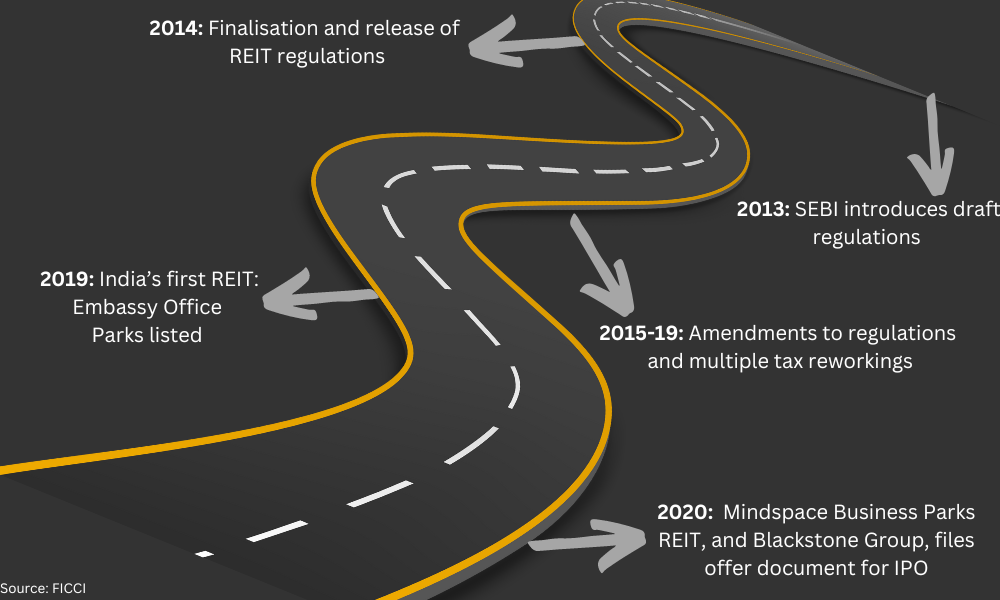Reduction of minimum investment amount by Securities and Exchange Board of India (SEBI) in REIT has increased retail participation in recent years.
Investing in real estate properties with little or no income is surging among retail investors, unlike a few years ago. Real estate investments are no longer an exclusive investment opportunity for High Networth Individuals (HNI) and high-income earners.
Abhishek Khanna, a freelance software engineer, says it makes sense to invest in Real Estate Investment Trust (REIT) as not everyone can spend Rs. 10 lakhs – Rs. 12 lakhs in one go.
REITs are investment instruments that offer ownership of real estate assets that the REIT Company invests in. REITs are entities that own or finance income-producing real estate assets in a range of properties.
Abhishek has invested around 0.5 percent of his portfolio in REIT stocks. “I have invested in Embassy REIT.Being a disciplined investor, I buy a small quantity of it along with my other stock investments every month.” In one of his Twitter posts about REIT investments, he said that one can invest in properties for as low as Rs. 300 with a brokerage like Zerodha.
This has been the inclination for many retail investors in the country, as a report from Smallcase, a brokerage firm, shows. Among the new-age investment products, REIT has seen the most significant growth. Since its inception in 2019, retail investors’ investments in this product have doubled. The report highlighted that, “reduction in minimum subscription amount to Rs. 15,000 from Rs. 50,000 since 2021 increased the liquidity for the entire REIT market and allowed greater participation from young retail investors.”
Embassy REIT, in a press release in July 2022, said that the unit holder base grew by 10 times. “Distributed over Rs. 5,800 crores to Unit holders, delivered over 15% annualized total returns and grew unit holder base by 10 times to over 40,000,” the statement stated.
The report by Smallcase also shows that over the past five years, while the growth in REIT investment has doubled in the overall portfolio of retail investors, the growth in digital gold has been less than a quarter.
Bharath, 22, said that he is potentially looking to invest in REITs and is evaluating which ones to invest in. “I’ve read about them, and it is a fascinating investment option. REIT makes sense for someone like me who does not have enough capital to invest in real estate.”
Rajamohan, a SEBI registered investment advisor, said that this increase in the REIT stocks by the retail investors was primarily due to the need for diversification of assets post-pandemic. “Real estate and gold are considered safe haven by the Indian investors. The REIT has enabled people with small savings to invest in real estate properties, which give a non-volatile, and safe return,” he said.
Investment in REIT stock also helps in diversifying his investments, said Abhishek. “Never put all your eggs in one basket,” he said, and added, “I try to diversify my investments to a limited extent. REITs share their profits with their shareholders, so dividend income is another aspect that one can consider apart from appreciation in value.”
Karthik Sambhandham, Chartered Financial Analyst (CFA), said that the REIT has the potential to attract more investment as it is in its early stages. Till now, this is in its discovery stage, he said. “Definitely, the early tryouts have been from people who understand that this is the future,” he added.
The reduction in the minimum investment amount has also served as a boost for the retail investor, Karthik said. “The reduction in the limit has got in more investors as it is a sweet spot of their monthly savings which is usually 25 percent of their overall income,” he said. He added that most retail investors are in the tax bracket of Rs. 5,00,000 – Rs. 7,00,000, so it is a good move by the SEBI..
Rajamohan said that the unit holder will benefit as they get the rent of the property in the form of a dividend, and the capital appreciation of the investment. For the REIT companies, he added that the initial revenue to the companies will be low, but in the long-term, the increase in the land value and the accumulated rents will boost their profits.
A unit holder can receive income from REIT investment through interest, dividends, rental income, or repayment of debt. From April 1, 2023, the Union Budget 2023, imposed a tax on the income earned by the unit holder if the income for the REIT company was made through the Special Purpose Vehicle (SPV). “This is a bummer as REIT has its tax obligations which make us pay more tax when we get the profits in hand, effectively reducing the absolute returns,” Karthick said.
Presently, the sale of REIT investment is subject to a tax rate of 15 percent if held for less than one year, and a rate of 10 percent if held for over one year with an investment above Rs. 1,00,000.
The investors currently have the option to invest in three REIT companies in the country. Embassy office parks, Mindspace Business parks REIT, and Brookfield REIT are the companies that can be invested in through the National Stock Exchange (NSE) or in the Bombay Stock Exchange (BSE). SEBI has mandated that 90 percent of the income earned must be distributed to the unit holders.

Globally, as of 2021, there are about 865 listed REITs with a combined market capitalization of $2.5 trillion. Nearly 40 countries, including all the G7, have REIT companies. Of the total funds raised in the last six years, more than 70 percent have been in the United States (US) alone. Singapore, the United Kingdom (UK), and Canada are other important markets for REIT.
One-year Compounded Annual Growth Rate (CAGR) for REIT investment is around 24 percent to 26 percent, the report by Smallcase shows. Karthick added, “Compared to traditional equity and gold, real estate sentimentally has been the best return provider for retail investors in a personal capacity. So this is a natural progression into REIT in stock markets as it gives you exposure to priorities rather than the company itself.”
Abhishek says that he will hold on to his investments despite having negative returns. “So far I have received negative 15.5 percent returns from my investments but that is temporary as the market is volatile. I still continue to buy the monthly commitment I have,” he said.



